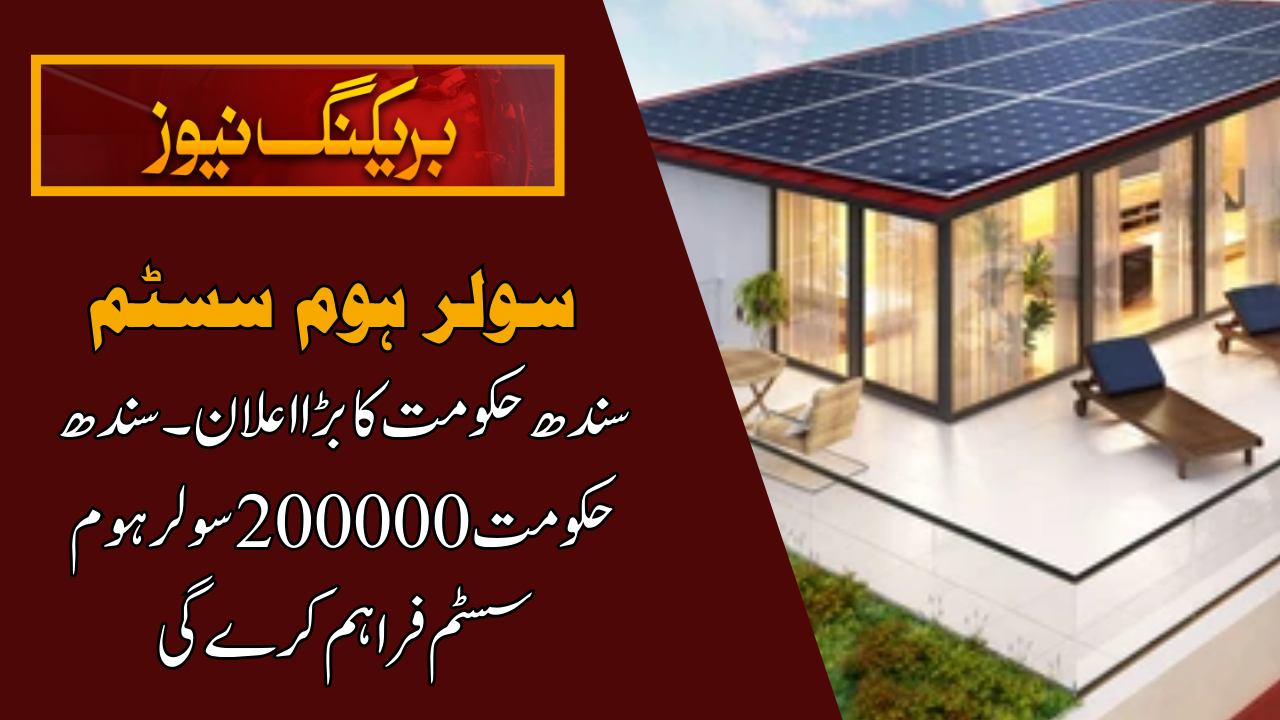Solar Home Systems
The Sindh government has launched an creativity to provide 200,000 solar home systems to households across the province. This program aims to promote clean energy, reduce electricity costs, and provide continuous power supply in rural and urban areas. Designed to support groups with limited or variable electricity access, this project reflects the government’s promise to sustainable development.
More Read:CM Punjab Solar Panel Scheme for Farmers
Quick Information Table
| Program Name | Sindh Solar Home Systems Initiative |
| Start Date | Announced in November 2024 |
| End Date | Ongoing (tentative completion: mid-2025) |
| Number of Beneficiaries | 200,000 households |
| Amount of Assistance | Free provision of solar home systems |
| Application Method | Online and offline registration |
Key Features of the Sindh Solar Home Systems Initiative
Objective
The program aims to:
- Reduce reliance on non-renewable energy sources.
- Address frequent power outages in rural areas.
- Promote the use of globally friendly and renewable energy.
- Lower electricity expenses for underserved communities.
More Read:30,000 Tube Wells to Go Solar in Balochistan
Who Benefits?
The project will primarily target:
- Rural areas lacking reliable electricity.
- Urban households facing high energy costs.
- Underserved communities recognized by local authorities.
Eligibility Criteria
To qualify for the solar systems, applicants must meet the following criteria:
- Residency:
- Must be a permanent resident of Sindh.
- Proof of residence such as a domicile or utility bill is required.
- Income Bracket:
- Families with low to reasonable income levels will be ordered.
- Annual income proof may be required.
- Household Conditions:
- The household should lack reliable electricity or have poor access to energy.
- Applicants owning alternative power systems may not qualify.
- Identification:
- Valid CNIC (Computerized National Identity Card) of the applicant is fixed.
More Read:Allied Bank Loan for Government Employees
Documents Required
Applicants need to provide the following documents for registration:
- Proof of Identity:
- CNIC copies of the head of the household.
- Proof of Residency:
- Domicile certificate or recent utility bill.
- Income Verification:
- Salary slip or income certificate.
- Declaration Form:
- A signed declaration stating no prior possession of solar energy systems.
- Photographs:
- Recent passport-size photographs of the applicant.

- Recent passport-size photographs of the applicant.
How to Apply
Eligible folks can apply through the following methods:
- Online Application
- Visit the official Sindh government energy department website.
- Fill out the online form with the required details.
- Upload scanned copies of the necessary documents.
- Submit the request and note the position number for future chasing.
- Offline Application
- Visit the nearest district office designated by the Sindh government.
- Collect and complete the application form.
- Attach photocopies of the required documents.
- Submit the form to the own office.
- Mobile Registration Centers
The government plans to set up mobile centers in remote areas to facilitate applications for residents unable to access online or district offices.
More Read:Apply for the ACAG Program
FAQs about the Sindh Solar Home Systems Program
What is included in the solar home system?
The package includes:
- Solar panels.
- Battery storage.
- An inverter.
- Essential electrical accessories.
Is there any cost to the applicants?
No, the program provides the solar systems free of cost.
How long does the application process take?
It typically takes 2–4 weeks to process applications and verify documents.
What is the lifespan of the provided solar system?
The solar systems are designed to last about 10–15 years with proper maintenance.
How will beneficiaries be selected?
Applications will be reviewed based on eligibility criteria. Priority will be given to households in areas with little or no electricity access.
More Read:Sindh Government Solar System Initiative
Can urban households apply?
Yes, but preference will be given to rural and underprivileged households.
What if my application is rejected?
Applicants can contact the helpdesk for clarification or appeal the decision.
Impact of the Program
The Sindh Solar Systems Initiative is expected to bring the following benefits:
- Economic Relief: Reduced energy bills for families.
- Environmental Benefits: Lower carbon emissions through the use of renewable energy.
- Social Upliftment: Improved quality of life in rural areas with better access to electricity.
- Energy Independence: Reduced need on the national grid and generators.
More Read:Zindagi Asan Program for Special Persons 2024
Conclusion
The Sindh government’s initiative to provide 200,000 solar systems is a significant step toward achieving energy independence and sustainability. By ordering rural and underserved communities, this program addresses long-standing energy challenges and promotes environmental saving.

